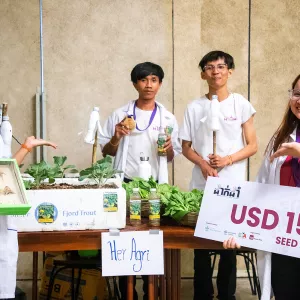Business incubation program for climate resilience in agriculture: Youth entrepreneurs present their business models
Phnom Penh, Cambodia (June 5, 2024) – The CGIAR Initiative on Asian Mega-Deltas (AMD), in collaboration with Impact Hub Phnom Penh, organized the Demo Day of the Dak Dam Innovators for Resilient Agriculture. It is a business incubator program that supports youth engagement and start-up businesses related to climate resilience and transformation of agri-food systems. The Demo Day allows the

Business incubation program for climate resilience in agriculture: Youth entrepreneurs present their business models
Phnom Penh, Cambodia (June 5, 2024) – The CGIAR Initiative on Asian Mega-Deltas (AMD), in collaboration with Impact Hub Phnom Penh, organized the Demo Day of the Dak Dam Innovators for Resilient Agriculture. It is a business incubator program that supports youth engagement and start-up businesses related to climate resilience and transformation of agri-food systems. The Demo Day allows the finalist groups of entrepreneurs to showcase their businesses and compete for start-up prizes.

Firstly, through this program, hackathons were held in universities in Phnom Penh and several provinces. Following the hackathons, 14 start-up business teams pitched their ideas. The most promising teams then entered an incubation phase where they received masterclass training to help them kick-start their businesses. Finally, Demo Day brought together the five most successful teams to present and compete. These are:
- Zero Carbon works to empower agriculture by using soil sensor technology and consultancy to recover soil health from low quality to high quality to ensure sustainable soil in the future.
- GreenCambo is a dynamic supplement company dedicated to transforming your health journey.
- Bansam is a modern nursery that cultivates plants for transplanting, grafting, and budding, supplying seedlings to farmers for their crops.
- HerAgri is producing a cabbage bait from cabbage waste recycling for insect pest prevention on the Brassicaceae family.
- Chiv Cheat leverages a Telegram chatbot to diagnose cashew plant diseases from Khmer-language images, voice messages, or text. The chatbot then provides farmers with targeted suggestions for treatment.

Dr. Rica Joy Flor, Scientist on Innovation Systems at the International Rice Research Institute (IRRI), explained the rationale behind supporting business incubation. She pointed out that successful climate-resilient transitions in agri-food systems require not only technical advancements but also enabling conditions. These include businesses and services that incentivize farmers to adopt sustainable practices.

In his special remarks, Dr. Bjoern Ole Sander, lead of AMD and scientist at IRRI, emphasized that AMD targets agri-food system transitions towards climate resilience for farmers and their communities in the Cambodian Mekong Delta. He shared that when the program was discussed, he was very supportive because it offered a way to engage businesses and reach young people.

AMD and other CGIAR Initiatives, such as Plant Health and Excellence in Agronomy, are also interested in pathways to support women and youth in agriculture and entrepreneurship. In the long run, the hope is that these successful startups will encourage the development of other businesses that can support farmers in rural communities.

